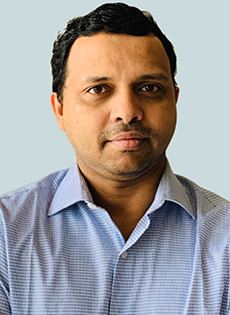BBB trainees contribute to all aspects of our research. Our fellows, many of them Intramural Research Training Award (IRTA) recipients, have experience and interests in various biostatistical and bioinformatic areas of study, from diagnostic methods to analysis tools for high-dimensional data.

Abhisek Saha, Ph.D., is a postdoctoral visiting fellow working primarily with Rajeshwari Sundaram, M.Stat., Ph.D.. His research focuses on building novel statistical methodologies, modeling strategies, and algorithms, using penalized estimations for survival analysis with frailty, to study how toxic chemical exposure affects time to pregnancy (as in the Longitudinal Investigation of Fertility and the Environment study). He is involved in developing machine-learning techniques for studying data from continuous monitoring devices like actigraphy. He is also working with reproductive and perinatal epidemiologists, using collaborative data to implement causal models for identifying placental measurements related to long-term mortality and assessing the effect of term deliveries on children’s neurodevelopment. Prior to joining NICHD, he was a postdoctoral fellow with the University of Texas MD Anderson Cancer Center, where he developed Bayesian models for genomics data. These models are used to build precision medicine framework that combines -omics information across various model platforms to predict therapeutic effects on patients using underlying similarity of -omics structures. He received his Ph.D. in statistics from the University of Connecticut. His thesis focused on Bayesian joint modeling of Item Response Theory and response time in longitudinal education data.

Jin Yang, Ph.D., is a postdoctoral visiting fellow working with Aiyi Liu, Ph.D.. He is involved in developing methods to evaluate and combine biomarkers to improve diagnostic accuracy based on group testing data, which can be applied in detection of COVID-19 infection. His research focuses on developing methods to save cost and time in screening; improve statistical efficiency; design more efficient studies involving multivariate longitudinal semicontinuous data; use pooling to measure biomarkers; and evaluate COVID-19 biomarkers. He completed his Ph.D. in statistics at The Hong Kong Polytechnic University in 2018.
 BACK TO TOP
BACK TO TOP